
This blog post was authored by William Deresiewicz, a Tivnu Board Member. Bill is an award-winning author, essayist and critic. His work has appeared in The New York Times and The Atlantic, and he has taught at Yale, Columbia and Claremont McKenna College, among others. Bill is the best-selling author of Excellent Sheep: The Miseducation of the American Elite and the Way to a Meaningful Life, and his next book, due out in July 2020, is The Death of the Artist: How Creators Are Struggling to Survive in the Age of Billionaires and Big Tech.
I’ve been proud to be associated with Tivnu since before it even had a name: as a friend of Steve’s when he was still dreaming up the organization back around 2009, as a member of the board since shortly after Tivnu launched in 2011, and as a kind of unofficial in-house writer for going on eight years. In the latter capacity, as I put together our grant proposals and fundraising letters, I often talk about what makes the Tivnu Gap Year such a wonderful experience for our participants: the opportunity for growth, the preparation that it gives them to thrive in college, the hands-on nature of the work, the way the program connects them more deeply with Judaism, the closeness of the group itself. But sometimes that can all just start to feel like words to me, phrases that I know to be true but that have become worn out through repetition. Recently, I had the chance to speak with three of our program alumni, and our conversations brought that language vividly back to life. I may write those things, but they have lived them.
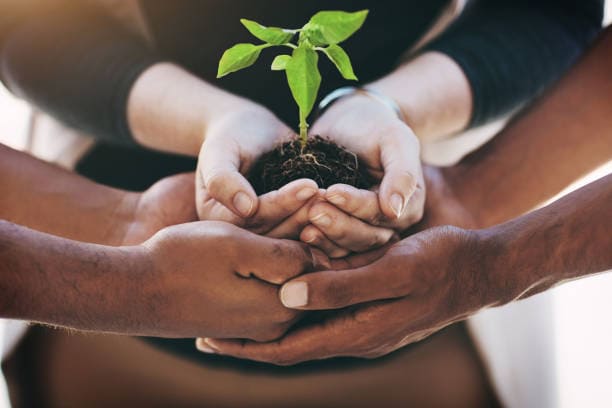
The alumni were Ami Furgang, Tivnu 2 (2015-16), now a senior at Middlebury College; Aliza Saunders, Tivnu 5 (2018-19), now a first-year student at Cornell University; and Zoe Schacter-Brodie, also Tivnu 5, now at Mt. Holyoke College but in the process of transferring to Whitman College. Here is some of what they had to say.
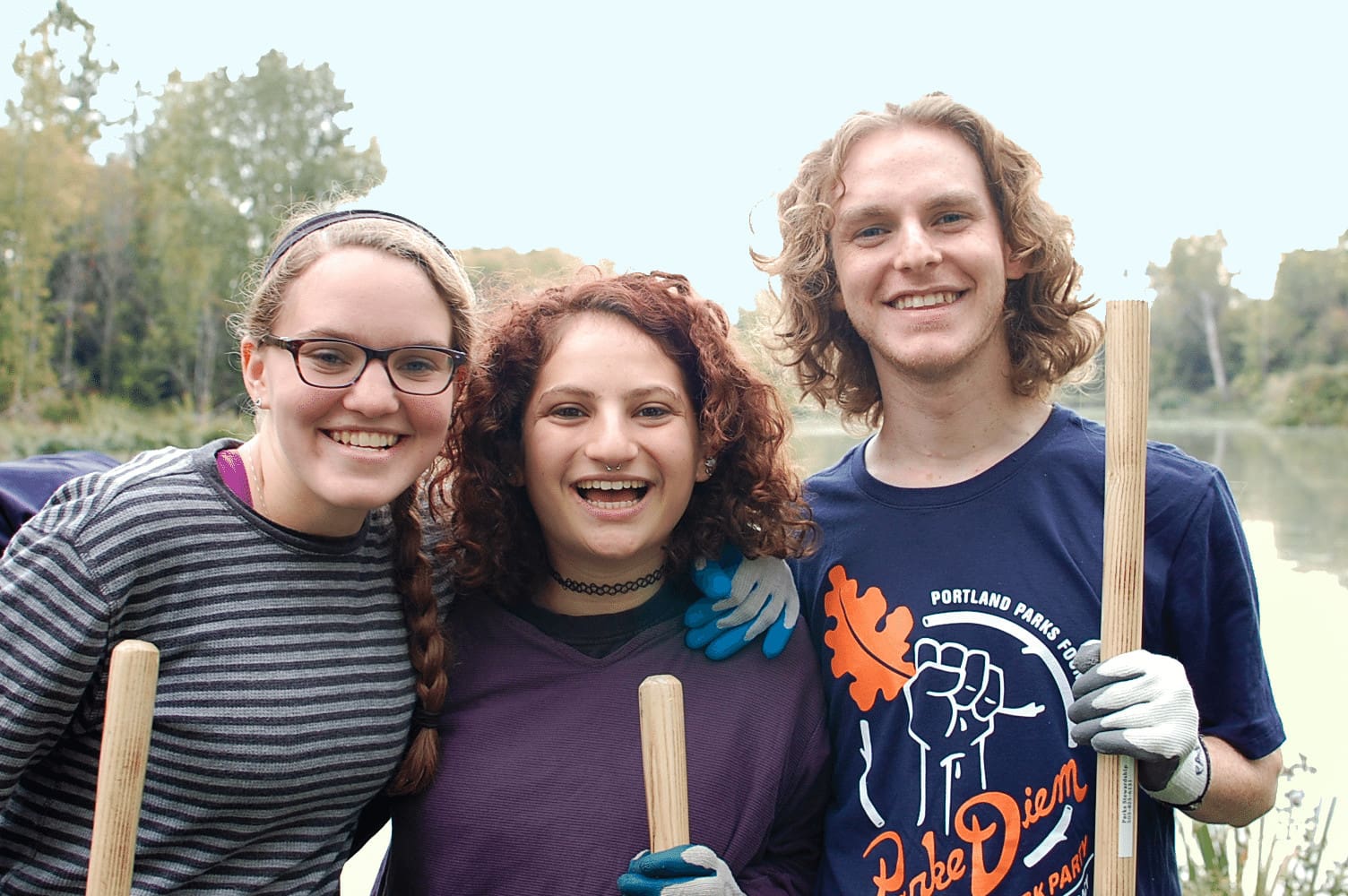
On the topic of growth, all three talked, above all, about the way the program helped them gain a sense of confidence and groundedness. Tivnu, Aliza put it, “definitely helped me with my confidence, and being comfortable with myself and what I have to say. I did this tonight at dinner. One of my friends, a guy, interrupted my friend who’s a girl, and I was like, stop interrupting her! And I wouldn’t have done that without Tivnu. I feel like I have a lot more power in regular conversations.” And here’s what Zoe had to say: “I became a lot more assertive and willing to stand up for myself and other people. And I gained so much confidence, and I felt like so much more of an adult by the end of the year and so much more like I had established an identity that I was proud of and excited about. Because being thrown into this new situation with no ties to who I was before and the people who knew me before—there was a lot of self-discovery that came with that. I really ended the year feeling like a different person in the best way.”
That kind of maturation also set all three of them up to have a much more meaningful experience in college. “I didn’t go into a gap year thinking, ‘Oh, I need to grow up and this transition from high school to college is going to help me,'” Ami said, “but I wasn’t super socially prepared for college, and looking around me, I see lots of people at school with mixed-up priorities and immaturity. And I think because I had a year away from school and classes, it was a time to care about things that were less material, like not caring about grades or homework or making teachers proud or trying to impress anyone, but it was just about being on the ground and having enriching experiences.” As a result, Ami went on, “it’s given me direction in a lot of ways that classes haven’t.” By her junior year in high school, Aliza said, she felt burned out. “I knew I wanted to go to college, but I felt like I was going through the motions, doing things because I had to.” Tivnu enabled her to give herself a better sense of purpose as to why she wanted to go to college in the first place. The program offered her a break from school, but, she said, it was also “rigorous—I was still learning and growing and challenging myself.”
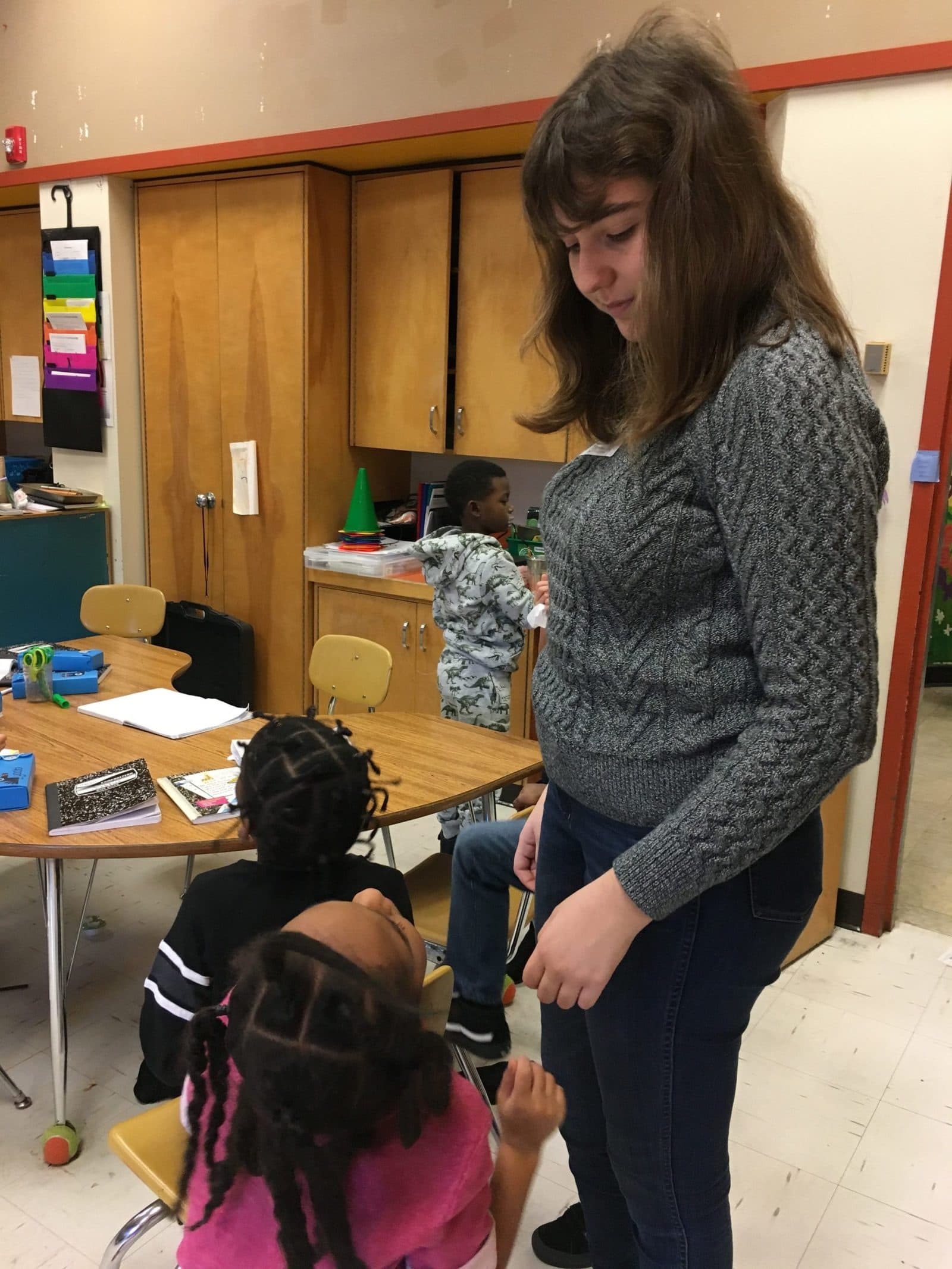
For me, the biggest revelation from our conversations had to do with what it means to say that the work that Tivnu participants do is “hands on.” I knew that they learn construction skills and help build houses for (and with) people experiencing homelessness, which is pretty much literally as “hands-on” as it gets. I also knew that they each do individually tailored internships with local, grassroots organizations that involve direct service to people in need. But I didn’t understand that what makes those experiences so transformational is that they entail a kind of immediacy, an emotional involvement, that “service,” even “activism,” rarely does. “Tivnu was all about showing up,” Ami said, “and talking directly with people who are implicated directly in the things you’re talking about”—showing up, that is, and developing relationships with people over the long term. One of Ami’s internships was at Sisters of the Road, an organization that provides nourishing meals in a safe, dignified environment for poor and homeless individuals. “I thought it was going to be all about me doing work to help other people, this kind of one-way equation, where I’m clearing tables, putting food on plates, but it was about creating this little imagined world which was real at the same time. It felt more inclusive than almost any other place I’ve ever been.”
Zoe did her internship at a local elementary school that serves predominantly lower-income kids, where she worked as a teacher’s aide in a first-grade classroom—four days a week, almost every week, for eight months. “It was really difficult,” she said. “I loved it. I really loved it. I really feel like I formed relationships with all these students. Every day was very different, and for many reasons, so different from my elementary school experience.” (Zoe grew up in Menlo Park, in Silicon Valley.) “Because so many students were coming from backgrounds of dealing with issues that I never even thought about when I was six years old. I just had to deal with a lot of emotion and chaos, but it was really amazing.” Her last day was “very tearful”: a little party, a lot of hugs. “It was a very sweet day.” The experience had also reordered her goals. She had always known that she wanted to go into education, but her interest had shifted from policy to classroom teaching. “It was just little moments that I would never be able to fully understand and take in if I wasn’t working directly with the kids,” she explained. “Little moments where I realized the gravity of their situation or the impact of the disparities in education that gave me so much drive and passion to work with this community, and that’s the kind of passion that I don’t think I could get if I was looking at it from a distance.”
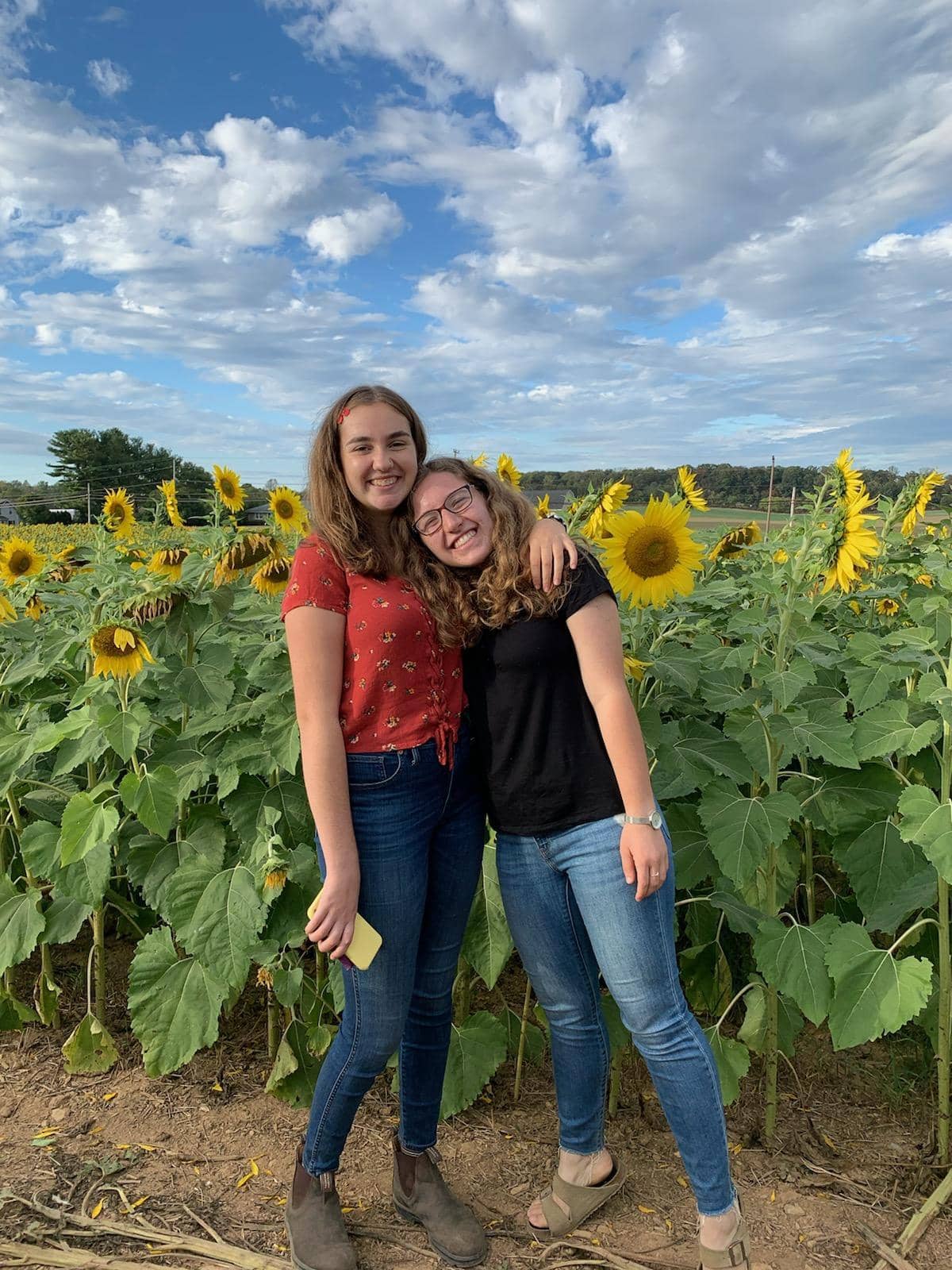
One of Tivnu’s objectives is to help participants understand that Judaism and social justice are inextricably intertwined: that the drive for social justice is an essential element of Jewish life, and that the Jewish tradition provides a powerful set of tools for social justice work. The alumni that I spoke with definitely got this. Next year, Aliza will become the Social and Environmental Justice Chair on the board of the Cornell Hillel. Her application for the spot, she said, was all about what she had done with Tivnu. And the program, by putting her together with different kinds of Jews and expanding her sense of Jewish history and tradition, also enabled her to explore her Judaism in a new way, to realize that there aren’t just three items on the menu, Orthodox, Conservative, and Reform—that she can, so to speak, do her own cooking. For Zoe, who had a bat mitzvah but did not grow up in a particularly observant family, Tivnu “definitely made me identify more with Judaism. On a daily basis, going through my life, I feel more spiritually connected to Judaism.”
For Ami, the Gap Year’s Jewish component was also central to the closeness that the group developed in the house. “In Tivnu,” Ami said, “it felt like we were creating our own little Jewish world with our own little customs, or like a collage of different people’s customs, and that felt like something unique. Tivnu really felt like family. We all were pretty different from each other in terms of what we wanted out of the program and what we thought it meant to live in community together, and at the same time we created something beautiful together. I felt it the strongest during our house meals and our Shabbat dinners when we invited other people over. We would feel like we were hosting them together, that we had an actual home to open up, not just a dining room table.”
All three of the alumni told me that they still felt very connected to the other people in their year. In fact, Zoe had just stayed with Aliza over Thanksgiving break. “I think that everyone in my cohort would agree,” Ami concluded our conversation, “that that was the best year of our lives.”
Follow Us
Sign Up For Updates
Taking a gap year in the US can be as meaningful as doing one abroad.
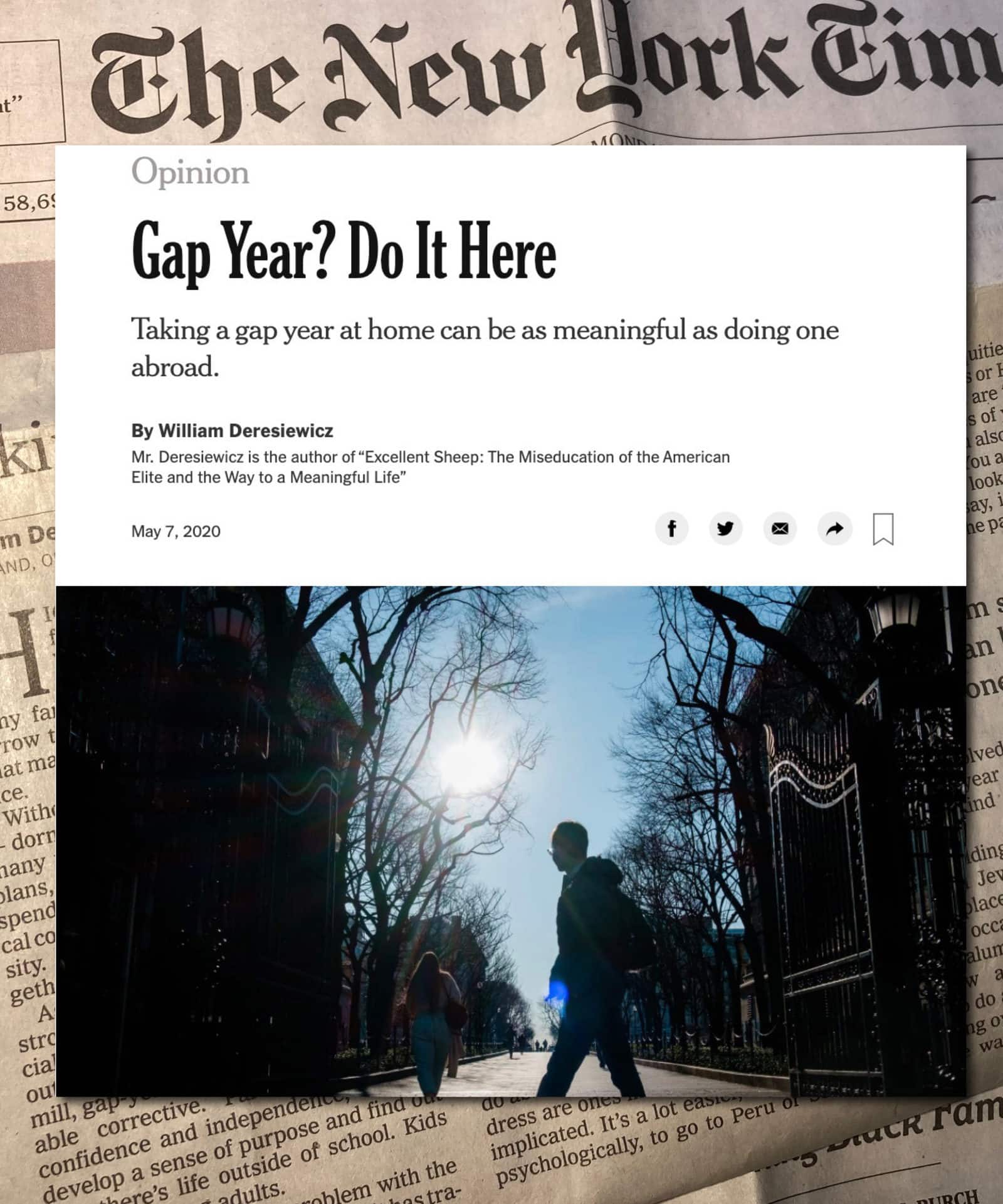 Featured in The New York Times
Featured in The New York Times